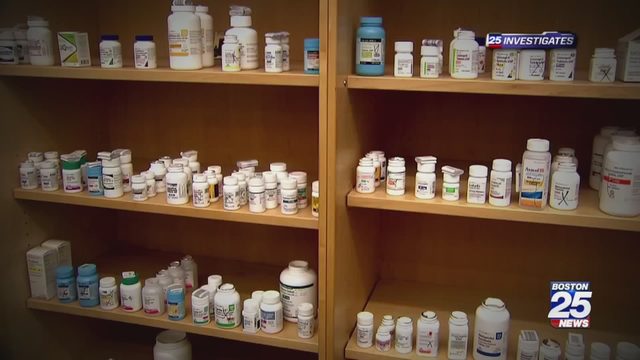This post was originally published on this site

Updated:
BOSTON — 25 Investigates found more than 38,000 pills, patches and liquids have been reported lost or stolen from Massachusetts pharmacies during the first nine months of 2017. Pharmacies are required by law to disclose theft or loss of controlled substances using a form known as “DEA 106”.
The cases we reviewed include a robbery at Rite-Aid Pharmacy in South Attleboro where Methadone was stolen. Methadone is an opioid medication prescribed to reduce withdrawal symptoms in people addicted to heroin or other narcotic drugs.
Injured Workers Pharmacy in Andover reported 120 Hydrocodone pills “lost in transit” and Sullivan’s Pharmacy in Roslindale documented 73 oxycodone tablets “tossed out with the trash”.
According to the data we compiled, two sedatives Clonazepam and Lorazepam top the list of missing pills.The opioid pain medication Oxycodone is the third on the list. More than 4,000 Oxycodone tablets were reported lost or stolen during the period of Jan. 1 to mid-September 2017.
36-year-old Jeffrey Bliss from Natick told 25 Investigates he is recovering heroin addict who first got hooked on pain pills at the age of 17. He says the prescription medications often end up for sale on the streets at prices two- to 20-times retail pricing.
“I’m glad I’m not in the grips of addiction anymore but I’m in the environment of it and I see it every day and it’s a sad thing.” Bliss explained adding, “the feeling you get, you just want more and more.”
Burglary, customer theft and armed robbery triggered more than a dozen “DEA 106” reports. In February, a CVS in Reading reported that three employees were terminated based on allegations they diverted more than $600 worth of drugs.
“What we seem to see is that the individual where the theft occurs may be addicted to a drug themselves or they may have an associate who might be addicted or they are just trying to divert those drugs out on the street,” said Walpole Police Chief John Carmichael. Carmichael serves as the chair of the Massachusetts Chiefs of Police Association’s Substance Abuse Committee.
According to Northeastern University Professor and Independent Pharmacists Association Executive Director Todd Brown, pharmacies are required to keep a perpetual inventory of drugs with a high abuse potential and verify the count every ten days.
“You’re seeing the increase in the loss because of the opiate issue and people trying to get to the pharmacies to get these medicines and also because more attention is being paid to these medicines.” Brown said.
25 Investigates also contacted the Massachusetts Board of Registration in Pharmacy. A spokesperson wrote back saying:
“So far in 2017, 93 investigations in the category of complaint type “Drug Violations” have been opened. In 2016, 113 similar investigations were opened, which is roughly the same rate. In 2015, 66 were opened. One possible explanation for the increase since 2015 is that the Board created a heightened awareness of the need to report, with the release of Board Policy 16-02; requirements and procedures for reporting theft or loss of controlled substances, originally adopted in March 2016.”
© 2017 Cox Media Group.
